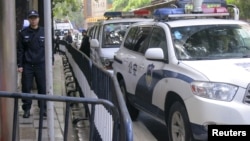Civil society in China received another blow in June when two activists were sentenced to harsh prison terms after being found guilty of “subversion against the state.”
Independent journalist and women’s rights defender Huang Xueqin, who was a prominent voice in the #MeToo movement in China, and who also reported on protests in Hong Kong, was sentenced to five years in prison. Labor rights activist Wang Jianbing, who advocated for workers with occupational diseases and physical disabilities, was sentenced to three years and six months. The two were tried together in secret after being held in pre-trial detention for almost 1,000 days.
In a written statement, State Department Spokesperson Mattew Miller said the United States condemns the unjust sentencing of Huang and Wang. He noted their lengthy pre-trial detention and their trial closed to journalists and to the public. “These sentences demonstrate the PRC’s continued efforts to intimidate and silence civil society,” he declared. “We urge the PRC to immediately release Huang and Wang, as well as other individuals unjustly detained for exercising their fundamental freedoms,” said Spokesperson Miller.
The number of such individuals remains unknown, but the PRC is recognized, as the non-governmental organization Freedom House has said, to be “a global leader” in such detentions. The first paragraph in the State Department’s most recent human rights report on China under the category of “Arbitrary Arrest” is both telling and grim: “Authorities detained or arrested persons on poorly defined allegations of revealing state secrets, subversion, and other crimes to suppress political dissent and public advocacy. Any piece of information could be retroactively designated a state secret, such as information on criminal trials, commercial activity, and any government activity. Authorities also used vaguely worded charges of ‘picking quarrels and provoking trouble’ broadly against many civil rights advocates. A counterespionage law granted authorities the power to require individuals and organizations to cease any activities deemed a threat to national security.”
State Department Spokesperson Miller said, “We continue to call on the PRC to live up to its international commitments and to respect the human rights of all persons, including freedom of expression and fair trial guarantees. We also urge the PRC to accept the many recommendations made this year during the PRC’s Universal Periodic Review of its human rights record.”






